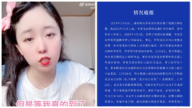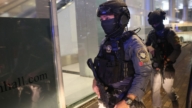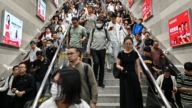【新唐人2012年10月4日訊】台灣「金馬獎」主辦方10月2號宣佈,大陸導演婁燁的《浮城謎事》獲得了年度金馬獎7項提名。不過在大陸,《浮城謎事》在公映前突然遭遇「再審」風波,差點無法如期上映,導演婁燁也宣佈放棄公映版的「導演署名」。這不禁讓人想問,在中國的電影審查制度下,一個導演要拍攝自己理想的影片到底有多難?
《浮城謎事》是大陸首部取材於網絡的真人真事電影,講述一個男人因婚外戀導致了一樁離奇的車禍命案,從而引發出一個情愛秘密事件。
《法新社》星期二說,這部影片因為涉及敏感題材,例如:中共警察的腐敗和新富階層的行為方式,因此,引起大陸審查當局的不滿。
香港作家、自由撰稿人張成覺表示,片中涉及中國警察的腐敗和色情場面,導演和當局之間的角力必然發生。
香港作家張成覺:「拍片這位,他是有觀察力,有這麽一個魄力來拍這麽樣一個題材。那麽從大陸當局的角度,肯定是要對他進行阻撓的。它有一句話叫做『無產階級專政的堅強柱石』,軍隊和警察,包括武警,都是他們維護這個政權的最主要工具,那麽,它當然要保護自己這些工具。」
《浮城謎事》劇本審查5個月、電影成片23天過審,今年5月在「戛納電影節」首映時,片頭已經帶上了所謂的「龍標」,代表影片已順利獲得內地的「公映許可證」,此後正式宣佈10月19號在全中國公映。
然而,在距離中國公映的41天,審查當局罕見的再次要求婁燁修改影片。婁燁拒絕,並將所有電影審查信息在個人微博上公布。
最後,雙方達成妥協。婁燁同意將結尾做一個3秒23格的「淡出」技術處理。廣電總局同意影片如期公映。但是婁燁發表微博,宣佈了一個電影史上前所未有的決定——取消《浮城謎事》這個第二次電影審查修改公映版的「導演署名」。
在中國的電影審查制度下,一個導演要拍攝自己理想的影片到底有多難?
北京獨立製片人楊偉東也有類似的經歷。他從2008年開始著手拍攝一部叫《需要》的記錄片,計劃採訪500位中國最有影響力的學者和政要,以他們對一組問題的回答,來記錄他們對基本價值觀的看法。
北京獨立製片人楊偉東:「他審查了我至少有將近兩年了,把我電腦搜走了,把我磁帶搜走了,甚麽結果都沒有。」
當局不僅拖延審查楊偉東所拍記錄片劇本的時間,到目前,楊偉東出門還被跟蹤,手機遭到監聽,當局還通知他不能離境。
楊偉東:「他就說我採訪了很多敏感的人,說我們的訪談會殃及到國家政治的穩定和安全。他沒有標準,只要是涉及到他自己的利益的時候,他就說這是敏感的。他現在把我也變成敏感的人,說我會殃及到這個國家的穩定。」
婁燁的《浮城謎事》入圍了2012年第65屆「戛納國際電影節」裡唯一的華語片。與中國國內不同待遇的是,目前《浮城謎事》已經銷售到德國、英國、日本等10多個國家。
婁燁9月6號在微博上表示:「不要害怕電影!電影沒那麼可怕,也沒那麼重要。如果一個國家一個政體因為電影而感到恐懼,那絕對不是因為電影太強,而是因為他們自己太脆弱了。」
採訪/李韻 編輯/尚燕 後製/黎安安
Chinese Censorship Hinders Filmmakers
On October 2, Chinese director Lou Ye’s film
‘Myth on the Floating City’ won 7 nominations at the Taiwan Golden Horse Film Festival.
However, in mainland China, the film had a difficult
battle against censorship, and barely managed to maintain it’s public screening date.
Lou Ye was forced to remove his name from the cast roll.
This reflects the real difficulty that Chinese film makers
are facing now under the current censorship system.
‘Myth on the Floating City’is a film based on real events,
telling the story of a man who entered into out of marriage
affairs, and suffered a car accident.
AFP reports stated Chinese authorities were not satisfied
with the film, because it touched some sensitive issues.
These included corruption of Chinese police officers,
and the behavior of China’s new wealthy class.
HongKong Writer Zhang Chengjue said the film
showcases the corruption of Chinese police.
This will naturally trigger a battle between
the director and the Chinese authorities.
Zhang Chengjue: “The film maker made his observation.
He is courageous in choosing such a topic.
From the point of view of the authorities,
it is certain they will stop this.
They always say that police are ‘a strong pillar
of the dictatorship of the proletariat’.
Police are a tool in maintaining power,
so they will protect their tools."
The film was under censorship for 5 months.
At its premier at Cannes Film Festival,
the film was marked with a ‘dragon seal".
This showed that it had been approved
for public screening in China.
It was announced that they will go public on October 19.
However, 41 days before the public screening, Chinese
authorities asked director Lou Ye to change certain content.
This request was rejected by the filmmaker.
Lou also published all the censorship
information on his personal micro-blog.
In the end, the two parties reached a compromise.
Lou agreed that he will technically fade out
the ending 3 seconds of the film.
Authorities then allowed him to do a public screening.
However, Lou announced on his personal micro-blog
that he made an unprecedented decision in film history.
This was to cancel the director’s name
from the credits of the revised film.
One can only wonder how hard it would be for the director
to make the film he wants to make under current censorship.
Independent Beijing producer Yang Weidong had similar
experiences, when he started his movie ‘Need’in 2008.
He planned to interview 500 of the most influential
scholars and politicians,
making them answer a number of questions,
and recording their view on basic values.
Yang Weidong: “I was censored for 2 years.
My computer was confiscated and my
tapes also. No result whatsoever."
Authorities not only postponed indefinitely
the censoring time of his movie script.
They also sent secret agents to follow him
and tapped his telephone conversations.
He was also told that he was not allowed to leave China.
Yang Weidong:"They said that I interviewed
many sensitive people,
claiming that my interviews would affect the stability
of the country. They didn’t have any standards.
Whenever it touches their interests,
they would say it is sensitive.
They turned me into a sensitive person, labeling
me as affecting the stability of the country."
『Myth on the Floating City’is the only Chinese movie
that won nominations at the 65th Cannes Film Festival.
Compared with the situation inside China,
it has been sold in more than 10 countries now.
Lou Ye wrote on his micro-blog, don’t be afraid
of the movie. It is not so horrible, not so important.
If a state power felt threatened by a movie, it is not because
the movie is too strong, but because they are too weak.






























